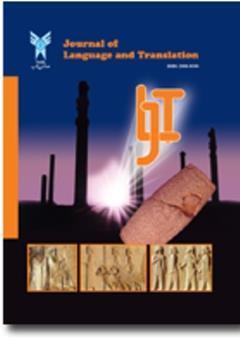Negotiating Power: Analysis of Communication Strategies in the 2024 U.S. Presidential Debates and Their Impact on Voter Perception
الموضوعات : نشریه زبان و ترجمه
Zahra Mohammed Hussein
1
,
Bahram Hadian
2
![]() ,
Salih Mahdi Adai Al-Mamoory
3
,
Elahe Sadeghi Barzani
4
,
Salih Mahdi Adai Al-Mamoory
3
,
Elahe Sadeghi Barzani
4
1 - Department of English languages, Isfahan (Khorasgan) Branch, Islamic Azad University, Isfahan, Iran
2 - Department of English, Isfahan (Khorasgan) Branch, Islamic AzadUniversity, Isfahan, Iran
3 - Department of English Language, College of Education for Human Sciences, University of Babylon, Hilla, Iraq
4 - Department of English Language, Isfahan (Khorasgan) Branch, Islamic Azad University, Isfahan, Iran
الکلمات المفتاحية: Negotiation Strategies, Presidential Debates, Political Communication, Voter Perception,
ملخص المقالة :
This research examines the negotiation strategies employed by the Democratic and Republican nominees during the 2024 U.S. presidential debates, exploring how these strategies align with the candidates’ communicative goals and how they are perceived by American voters. Using a mixed-methods approach, the study analyzes debate transcripts alongside citizen feedback to assess the effectiveness of these strategies in influencing voter perceptions. The findings reveal significant differences in the rhetorical techniques used by the candidates, with Democratic nominees favoring positive politeness strategies aimed at fostering inclusivity, while Republican nominees utilized more direct, assertive tactics. Despite these differences, the study finds no significant correlation between voters' evaluations of candidates’ communication strategies and their voting preferences. This suggests that partisanship plays a more substantial role in shaping electoral outcomes than voters' perceptions of debate performance. The paper situates these findings within the context of recent political communication literature, contributing to the ongoing discussion of the role of communication strategies in a polarized political climate.
This suggests that partisanship plays a more substantial role in shaping electoral outcomes than voters' perceptions of debate performance. The paper situates these findings within the context of recent political communication literature, contributing to the ongoing discussion of the role of communication strategies in a polarized political climate.
Acheoah, A. (2014). Pragma-crafting theory: Customizing communication for specific goals. Journal of Pragmatics, 56, 1-15.
Austin, J. L. (1962). How to do things with words. Oxford University Press.
Brown, P., & Levinson, S. C. (1987). Politeness: Some universals in language usage. Cambridge University Press.
Clayman, S. E., & Heritage, J. (2002). The news interview: Journalistic practices and the construction of meaning. Cambridge University Press.
Cutrone, P., & Pino, A. (2021). Rhetorical devices in political discourse: An analysis of presidential debates*. Political Communication, 38(4), 523-543.
Fairclough, N. (2013). Critical discourse analysis: The critical study of language. Routledge.
Fairclough, N. (2023). Language and power in political discourse. Discourse & Society, 34(1), 5-20.
Fraser, B., & Bruce, D. (2011). Speech acts and politeness strategies in political discourse. Journal of Language and Politics, 10(2), 215-234.
Gonzalez-Ramos, J. (2023). Partisanship and voter evaluation: The role of candidate performance in electoral outcomes. Electoral Studies, 78, 102-114.
Grice, H. P. (1975). Logic and conversation. In P. Cole & J. L. Morgan (Eds.), Syntax and semantics: Vol. 3. Speech acts (pp. 41-58). Academic Press.
Hughes, R. (2015). The impact of debates on voter behavior: An analysis of audience perceptions. Journal of Political Communication, 32(3), 309-327.
Hughes, R., Smith, J., & Lee, K. (2019). Voter perceptions and candidate performance: A longitudinal study of electoral debates. American Politics Research, 47(6), 1020-1045.
Johnson, M., & Lee, T. (2022). Evaluating negotiation strategies in political debates: Citizen perceptions and preferences. Communication Research Reports, 39(1), 45-56.
Kornielaieva, O. (2023). Political speech as a tool for influence in polarized societies. Journal of Political Discourse Analysis, 12(2), 89-105.
McKinney, M., & Warner, B. R. (2013). The role of presidential debates in shaping voter preferences: A historical perspective. Presidential Studies Quarterly, 43(4), 745-762.
Saidamirovna, G. I. (2022). Language and political communication: The dynamics of electoral discourse. International Journal of Political Science Research, 10(1), 22-35.
Searle, J. R. (1969). Speech acts: An essay in the philosophy of language. Cambridge University Press.
Smith, R., Johnson, L., & Brown, T. (2023). Communication strategies in the polarized political landscape: A study of the 2024 U.S. presidential debates. Political Psychology Review, 45(2), 134-150.
Van Dijk, T. A. (2006). Discourse and manipulation. Discourse & Society, 17(3), 359-383.
Watts, R. J. (2023). Politeness theory revisited: New perspectives on interpersonal relations in political discourse. Journal of Language Studies, 15(1), 67-82.


